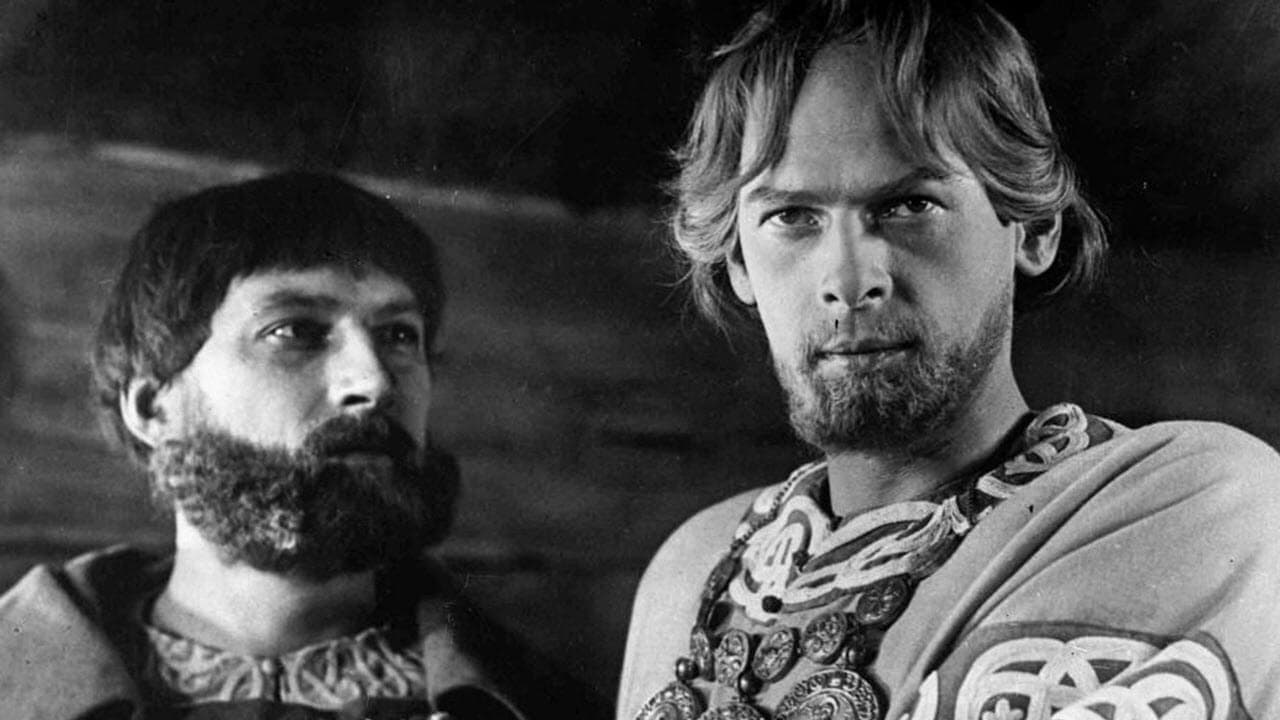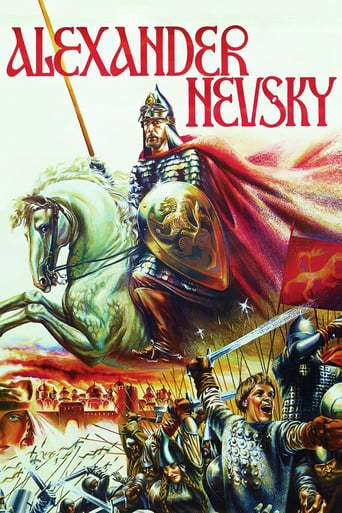

Sergei Eisenstein's "Alexander Nevsky" is a biopic of the famous prince, but when released it was seen as an expression of the growing suspicion of Nazi Germany. Indeed, the battle scenes make the Teutonic Knights - aka the Germans - get depicted as faceless goons who have no qualms about killing anyone. The epic battle scene is probably the most well remembered scene in the movie. It basically says "If you invade Russia, expect the same fate as befell the Teutonic Knights." Hitler didn't heed the warning, and his hoped-for thousand-year Reich only lasted twelve years (the harsh winters didn't help matters).Understanding that it's a form of propaganda, it's an impressive movie. I wouldn't expect otherwise from Eisenstein. If you're going to teach a course on Russian cinema, you would have to include this one. Excellent movie.
... View More1st watched 1/26/2014 -- 4 out of 10 (Dir-Sergei Eisenstein & Dimitri Vasiliev) Russian propaganda historical film about the people defending their homeland(the mother Russia) in the 13th century with Prince Alexander Nevsky leading the battles. It starts with the main character fishing despite his recent victory over the Swedes, and is a reluctant leader unless called upon by his people. This is probably the kind of film that the Russian people want to hold onto as a good look at their heritage with Sergei Prokofiev(a Russian) providing the soundtrack, but that doesn't mean it makes for a good movie. The fighting scenes are somewhat realistic, for the time, but not necessarily entertaining or groundbreaking visually. If you learn something from a movie this is definitely a plus but unfortunately all I learned is who the Russians were fighting against(the Germans strangely coupled with the Roman church). There is an attempt to add an extra story with romantic possibilities as two of the men early want to marry the same girl, but then fight together and become best buddies before the end of the movie who don't care as much about the girl. What was missing for me from the movie was information about the man, Alexander Nevsky. What the movie really chronicles is the history of the country despite being titled by the conqueror's name. We learn very little about the man and not a whole lot about the people in general. This is definitely a stylistic movie that tries to blend Prokofiev's music with the visuals and action in the film, but unfortunately is too bland and straight forward not allowing the viewer to understand the motivations behind the characters. This may be kind of a sign of the times in this country unfortunately it filters into the movie. This was definitely Stalin's child(the state OK'd anything put out at this time), and he may have liked the movie but I did not.
... View MoreAlexander Nevsky is a series of superb sequences of cinematic opera that pass from pastoral to lamentation and end in a triumphal cantata. The story takes place in 1242. Prince Alexander Nevsky (Nikolai Cherkasov) defeats the Teutonic Knights in a battle on the ice of Lake Peipus.The film is a splendid historical pageant which shows director Sergei Eisenstein at his most inventively pictorial, and climaxes in a superb battle sequence using music instead of natural sounds. Several films have scenes strongly influenced by the Battle of Lake Peipus, including Doctor Zhivago (1965), Mulan (1998), and King Arthur (2004). Alexander Nevsky was kept out of circulation due to changing political winds, and then enshrined as perhaps the most influential Soviet-made historical film.
... View MoreI believe anyone who enjoyed Eisentein's Ivan the Terrible movies would enjoy this well crafted movie. This movie played out like "Lord of the Ring: Return of the King", but without the special effect but as good and better drama.We have the German, who dressed like KKK, conquered Novgorod of Russia. The Russian summoned Nevsky to lead them to fight the German to save Russia. Nikolai Cherkasov, who played Ivan in the Ivan the Terrible films, was charismatic as Nevsky. The first 10 min how he handled the passing by Mongol was captivating.Many of the scenes were beautiful even in black and white. The anticipation of War did not require any dialogue such as "how many enemy we will be killing", etc. Except for a few speeches, the film can basically be played out as a silent film. The fighting scene can hold up to those of the Civil War fighting scene of The Birth of a Nation.Another strength of the movie is the great musical score, by Sergei Prokofiev. The music gave an epic feel to the movie in those scenes without dialogue.
... View More